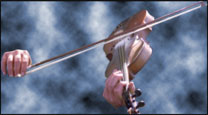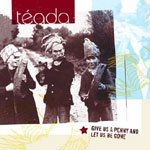
Welcome
to a site which celebrates music and culture from around the world
JigTime International
JigTime International

Give Us a Penny and Let Us Be Gone - Téada
By Mark Pippinger
 Téada are a great young band, a band whose music sticks closely
to “the tradition.” They burst on the scene a couple of years ago, won
the BBC Radio 2 “Best Newcomers” award, and released their first album
on the Green Linnet label, “Téada.” Since then, they have been
known as one of the most hard-working bands in Irish music, gigging all
over the U.S. and Europe. Now they have a fifth band member (Paul Finn
on accordion), and another album, also on the Green Linnet label, and
it certainly does not disappoint.
Téada are a great young band, a band whose music sticks closely
to “the tradition.” They burst on the scene a couple of years ago, won
the BBC Radio 2 “Best Newcomers” award, and released their first album
on the Green Linnet label, “Téada.” Since then, they have been
known as one of the most hard-working bands in Irish music, gigging all
over the U.S. and Europe. Now they have a fifth band member (Paul Finn
on accordion), and another album, also on the Green Linnet label, and
it certainly does not disappoint.
“Give Us a Penny and Let Us Be Gone” takes its title from one of the common lines uttered by Wren Boys during their Stephen's Day revels, and in fact the cover sports an old photo of what look to be Wren Boys from some years ago. The album opens relatively slowly, with a song beautifully sung by Oisín Mac Diarmada, “Bríd Thomáis Mhurchadha.” The pace quickens in the next track with a couple of hornpipes, “Stepping Stones” and “An tSeanbhean Bhocht.”
The band really takes off in the third track, a blistering (no other cliche seems to fit as well) set of reels including “The League Reel” followed by “Peter Horan's” and finishing with “The Flannel Jacket.” It is this third track that is my personal favorite, with Oisín's blazing fiddle matched in the first reel by the deft flute work of John Blake, in the second by some lovely bodhrán work from Tristan Rosenstock, Paul Finn bringing in the accordion on the third time through the tune, and Sean McElwain backing up on bouzouki through both tunes. On the third reel, the entire band kicks in, still at a fast pace, for what seems to me a lovely track.
The fourth track is an interesting setting of “The Ace and Deuce of Piping” (or “Pipering”), starting with the sound of footsteps, followed by the tune, initially just on fiddle, with other instruments being slowly added to build to a climax, followed by the slow dropping off of each instrument to again leave just the fiddle carrying the tune. At the very end, a voice (I know whose, but I'm not telling--you'll have to read the liner notes) recites a Wren Boys verse, ending with the album title, and the sound of clinking coins, followed by the closing of a door. A bit melodramatic perhaps, but a very nice and somewhat imaginative rendition of this well-worn tune.
Another set of reels follows, starting with a relatively slow turn through “Humours of Lissadell,” then a nice transition on box to a faster pace on “Maude Miller” and finally a slow start running into a very nice pace on “The Jolly Tinker,” as if effort was required to get the tune going (a nice effect, I think).
Then follows one of my favorite songs in Irish, “Thíos i dTeach An Tórraimh,” a song I've often heard sung by folks in Donegal. The pace on this song is a little faster than I've usually heard it sung, but certainly not too much so (personally I like the slightly faster tempo), and I really like Oisín's interpretation. There's some very nice instrumental backup on this track.
The next track mixes a hornpipe, a fling, a slip jig (one of my favorites, “The Foxhunter's”), and a reel, to nice effect. There's is particularly nice flute work on the fling (“Clarke's”). The band seems to build up to a climax in the final reel, “The Old Maid,” and when it doesn't seem they can get any more energy out of that, they finish with one very emphatic turn back through “Foxhunter's.”
Following that are a couple of barndances (“John Egan's/Saunders' Fort”), then a very nice set of jigs and single jigs, on which (for “Tá An Coilleach Ag Fogairt An Lae”) they are joined by Seamus Mac Mathúna, who gives a lovely example of lilting. After that, a slow air, “The Trip We Took over the Mountain,” beautifully played. It's then back to a quicker pace with a set of jigs that starts with Paul playing “King of the Pipes” with some very nice bouzouki work from Sean, followed by Oisín for “Queen of the Fairies” with again some nice bodhrán from Tristan and with Sean joining in on banjo, and finishing up with a spirited version of “The Woodcock” from the whole band.
Oisín contributes another song, “Píopa Ainde Mhúir,” a funny little song about a smokey pipe. There follows a set that starts with a march (“The North Wind”) and then goes into two reels, “Lady Kelly's” and “Sporting Nell.” I like the transition from stately march into fast reels (I've always been a sucker for that “slow-to-fast” setting).
The last track is my second-favorite of the whole album, a set of jigs that includes “The Green Blanket,” “Up Sligo” and “Up Leitrim.” Very nice flute work on the first jig of the set, backed up by bouzouki and then joined by fiddle, and the fiddle and box take it away on the second jig, with a perfectly-timed entry of the bodhrán (who says we bodhrán players “don't know when to come in”?!). The last jig of the set is very fast and energetic, and the brilliant turn into this tune has more than once caused me to spontaneously emit a “whoop,” to the occasional surprise of other passengers in my car.
All in all, this is a great CD from a great young band. I am most impressed by the skillful playing of all in the band (but especially the brilliant fiddle of Oisín and the terrific bodhrán of Tristan), and I'm hoping there will be much, much more to come from these lads.
 |